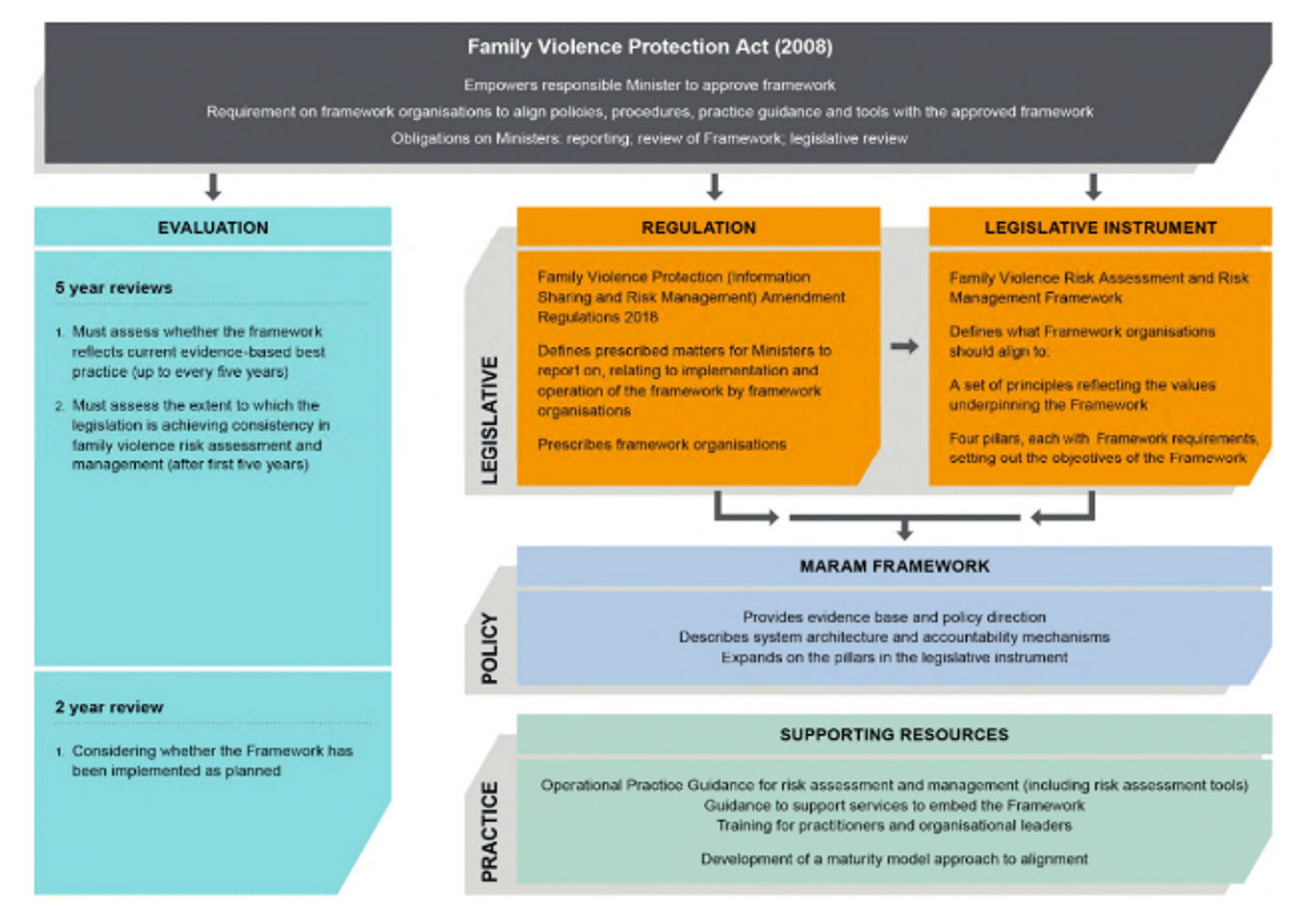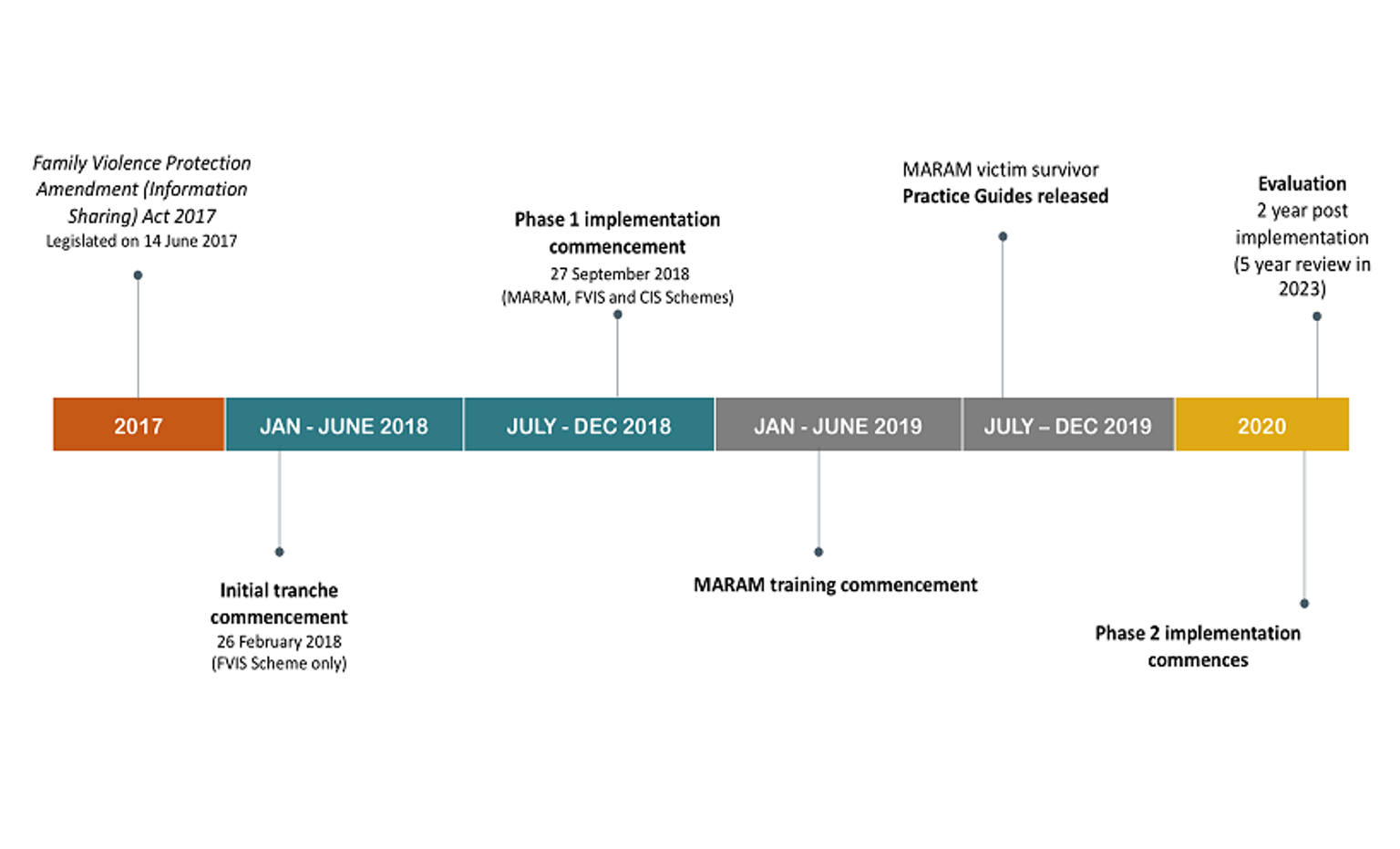Summary of the Reforms
Recommendation 1 of the Royal Commission was to deliver a ‘comprehensive framework that sets minimum standards and roles and responsibilities for screening, risk assessment, risk management, information sharing and referral throughout Victorian agencies’ (Royal Commission into Family Violence:(opens in a new window) report and recommendations).
The framework was recommended to include:
- weighted risk factors to identify risk as low, medium or high
- evidence-based risk indicators that are specific to children
- comprehensive practice guidance
- consideration of the needs of the diverse range of victim survivors and perpetrators
The Royal Commission specifically considered the appropriate operating mechanism to ensure departments, agencies and organisations could be supported in aligning to the redeveloped framework. It concluded that primary legislation should be used to set out relevant family violence principles, and the use and purpose of a framework. The content and detail of the framework could then be approved by the relevant minister or ministers through Regulations, providing flexibility to amend content if changes in practice emerged and to prescribe organisations. (Royal Commission into Family Violence(opens in a new window): report and recommendations final report).
The MARAM Framework delivers on this recommendation. The MARAM Framework commenced in law from September 2018 and is the approved family violence risk assessment and management framework under the Family Violence Protection Act 2008(opens in a new window) (FVPA).
Figure 1 provides a summary of the legislative and regulatory environment created by MARAM.
The Family Violence Information Sharing Scheme (FVIS Scheme), a key enabler of MARAM, commenced in February 2018. The FVIS Scheme enables organisations and services prescribed as Information Sharing Entities (ISEs) to share information related to assessing or managing family violence risk. The FVIS Scheme supports ISEs to keep perpetrators in view and accountable, and to promote the safety of victim survivors of family violence.
Concurrent with the commencement of MARAM, the Child Information Sharing Scheme (CIS Scheme) also commenced, covering a similar group of workforces. The CIS Scheme allows prescribed organisations and professionals who work with children, young people and their families to share information with each other to promote children's wellbeing and safety. Family violence and child wellbeing concerns often co-occur, and in practice, professionals are likely to consider using either or both schemes in combination as appropriate.
As a consequence, resources, training and governance groups have maintained a focus on all three reforms.
Figure 2 illustrates a broad overview of the timeline of the reforms from commencement, along with key milestones.
In September 2018, Phase 1 prescribed more than 855 organisations with more than 35,000 professionals to align with MARAM. These framework organisations include the specialist family violence sector and services in housing, mental health, alcohol and other drugs, police, courts, justice and corrections. Appendix 1 sets out a comprehensive list of all organisations prescribed in Phase 1 across all three reforms.
Work is currently underway to prescribe a second phase of framework organisations from late 2020. Subject to stakeholder consultation and government decisions, it is expected Phase 2 will focus on universal services including in health and education (noting 'Universal service systems that are available to all community members are ideally placed to play a much greater role in identifying family violence at the earliest possible stage.’ Source: RCFV: summary and recommendations, p. 9).
It is anticipated Phase 2 will bring in more than 350,000 extra professionals from an estimated 8,000 organisations. Appendix 2 sets out the proposed list of Phase 2 workforces, which, at the time of preparation of this report, is subject to ministerial approval.
Updated

